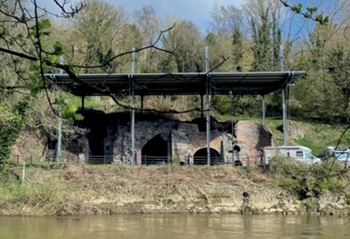Public project: feasibility studies
 The feasibility studies stage considers the options for satisfying the client's needs, enabling them to prepare a business case for the preferred option and deciding whether to proceed with the project. It is possible to make an outline planning application during this stage if the risk to the project of not receiving planning permission is very high, or if delays in receiving planning permission would be problematic.
The feasibility studies stage considers the options for satisfying the client's needs, enabling them to prepare a business case for the preferred option and deciding whether to proceed with the project. It is possible to make an outline planning application during this stage if the risk to the project of not receiving planning permission is very high, or if delays in receiving planning permission would be problematic.
Depending on how experienced the client is, they may appoint external consultants such as independent client advisers or a project manager to assist them. This means that some of the tasks attributed to the client below might actually be carried out by independent client advisers or a project manager and vice versa.
Contents |
[edit] Appointing independent client advisers.
The client updates the preliminary business case and strategic brief to reflect comments made at the end of the previous stage and collates site information ready to issue to the independent client advisers.
The client appoints independent client advisers and if necessary a project manager. Go to work stage: Public project: appointment. NB The role of project manager can be performed by in-house personnel, or may be taken on by the project sponsor if they have the relevant experience.
The client chairs a start-up meeting to issue information to new appointments (such as the strategic brief and site information). This meeting is also an opportunity to establish collaborative practices and agree a programme.
[edit] Developing the strategic brief.
The independent client advisers work with the client to help them develop the strategic brief sufficiently for feasibility studies and options appraisals to be carried out.
The independent client advisers assess the site information issued to them by the client and undertake site appraisals. The independent client advisers obtain any further information about the site that might be required to undertake feasibility studies, such as; site surveys, information about site services, site access conditions, legislative constraints, existing planning consents etc. Where necessary, approval should be sought from the client (for example site surveys requiring additional expenditure).
The independent client advisers co-ordinate the preparation of feasibility studies to establish whether the project is viable, and to identify feasible options. The client considers the feasibility studies, and agrees which options the independent client advisers should develop.
[edit] Preparing an options review report.
The independent client advisers co-ordinate the identification of any further site surveys or site information required in order to carry out options appraisals and where appropriate seek approval from the client.
The independent client advisers prepare options studies with a view to drafting an options review report.
The independent client advisers and the client prepare for and enter into consultations with the local authority and other statutory authorities and assess possible planning permission requirements and other statutory requirements (such as the need for an environmental impact assessment for the options). NB See the work stage: Public project: planning permission for additional information.
The independent client advisers prepare initial cost appraisals of the options.
The independent client advisers co-ordinate the preparation of a draft options review report.
The client considers the draft options review report and either selects a preferred option or instructs the independent client advisers to revise the options review report.
[edit] Preparing a business case and project execution plan.
The independent client advisers co-ordinate further assessment of the preferred option to assist the client in preparing the business case and project execution plan, including:
- Establishing the requirements for statutory approvals and other regulations with which the preferred option must comply.
- Entering into consultations with utility providers.
- Assessing the need for additional specialist advice and advise the client.
With the benefit of assessments carried out by the independent client advisers, the client develops a business case and project execution plan for the preferred option.
The client considers, and if appropriate approves the business case and project execution plan for the preferred option and gives instructions to proceed to the next stage along with any other instructions that may be necessary.
Once it has been decided that the project will progress to the next stage, the client places (or arranges to have placed) all necessary OJEU or other advertisements.
At this stage, the client and the independent client advisers may consider whether it would be appropriate to make an outline planning application for the proposed development. It can be important that the planning parameters for the project and, where appropriate, outline planning consent are obtained prior to tender, as any changes to the project resulting from the planning permission process after the integrated supply team has been appointed may prove expensive for the client and can cause significant delays. If an outline planning application is required, go to the work stage: Public project: planning permission.
Featured articles and news
Art of Building CIOB photographic competition public vote
The last week to vote for a winner until 10 January 2025.
The future of the Grenfell Tower site
Principles, promises, recommendations and a decision expected in February 2025.
20 years of the Chartered Environmentalist
If not now, when?
Journeys in Industrious England
Thomas Baskerville’s expeditions in the 1600s.
Top 25 Building Safety Wiki articles of 2024
Take a look what most people have been reading about.
Life and death at Highgate Cemetery
Balancing burials and tourism.
The 25 most read articles on DB for 2024
Design portion to procurement route and all between.
The act of preservation may sometimes be futile.
Twas the site before Christmas...
A rhyme for the industry and a thankyou to our supporters.
Plumbing and heating systems in schools
New apprentice pay rates coming into effect in the new year
Addressing the impact of recent national minimum wage changes.
EBSSA support for the new industry competence structure
The Engineering and Building Services Skills Authority, in working group 2.
Notes from BSRIA Sustainable Futures briefing
From carbon down to the all important customer: Redefining Retrofit for Net Zero Living.
Principal Designer: A New Opportunity for Architects
ACA launches a Principal Designer Register for architects.




















